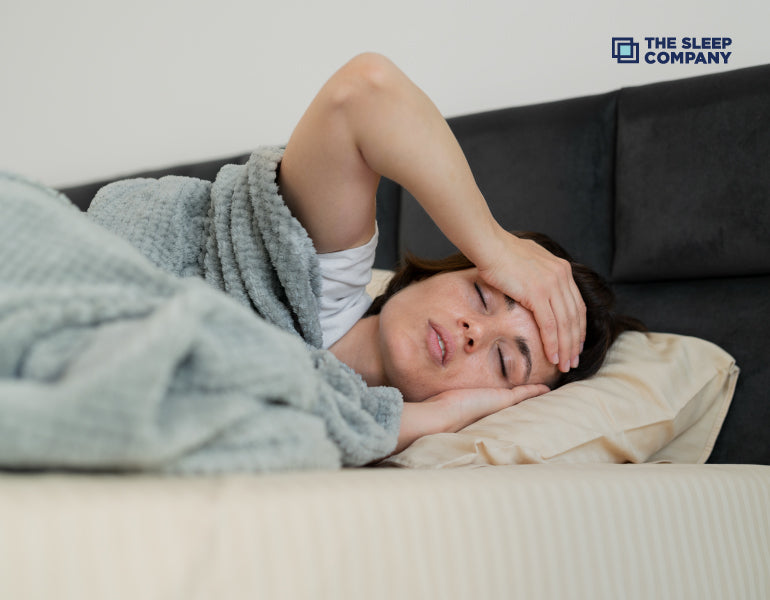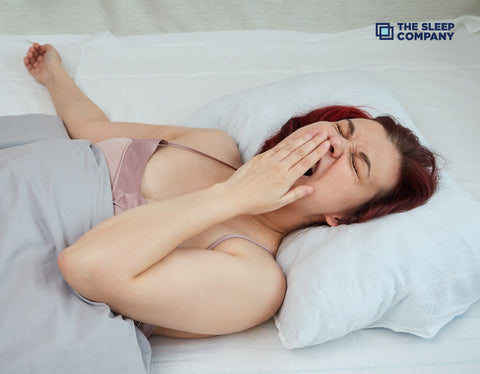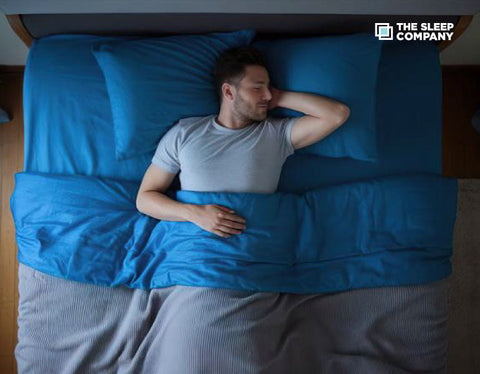My Cart

What Is Hypersomnolence Disorder And How To Recover From It?

Sleep is vital for our overall health. Yet, 55% of Indians aren't getting enough. Infact, we are the second most sleep-deprived country.
A poor night's sleep drains productivity and can make you feel groggy or irritable. But for those suffering from hypersomnolence disorder, this problem is severe.
A poor night's sleep drains productivity and can make you feel groggy or irritable. But for those suffering from hypersomnolence disorder, this problem is severe.
With this disorder, despite getting enough sleep, you may still not feel like your best self. It can cause daytime fatigue and extreme tiredness, adversely impacting overall health.
Ahead, we tell you everything you must know about hypersomnia, its causes, symptoms, and how you can recover from it. Keep reading!
What Is Hypersomnia or Hypersomnolence Disorder?
Excessive sleeping is called Hypersomnia or hypersomnolence disorder. This is a condition where you are unable to stay awake or alert during the day, despite getting the necessary amount of sleep each night.
For instance, a person with hypersomnia may sleep 9-10 hours straight and yet feel tired and lethargic. This tiredness is almost bone-deep and you may feel absolutely drained of any energy.
People suffering from Hypersomnia may also fall asleep several times during the day. These sleep episodes can be unintentional, which makes them dangerous.
Hypersomnia is an uncommon sleep disorder but requires immediate management as it can negatively impact your life.
Hypersomnolence Disorder Symptoms

Don't confuse hypersomnia with a poor night's sleep.
Here are some of the main symptoms of hypersomnolence disorder. If you are suffering from any, make sure you speak with your healthcare practitioner for more information.
- Increased sleepiness during the day even after a good night's rest
- Sleeping for longer than normal duration, such as 10 hours or more
- Finding it extremely difficult to wake up in the morning
- Feeling confused after daytime naps
- Naps may feel unrefreshing
- Not having a healthy appetite
- Feeling irritable or anxious
- Unable to concentrate
- Memory problems
- Lack of energy
- Slow speech
- Restlessness
- Hallucinations
- Headaches
Who Is At Risk Of Hypersomnolence Disorder?
Hypersomnia effects 4% to 6% of the population. It is more commonly diagnosed in females than in males and is usually identified during adolescence or young adulthood.
However, people at risk of hypersomnolence disorder are:
- Individuals suffering from other sleep disorders, such as sleep apnea or restless legs syndrome.
- People suffering from neurological disorders, head injuries, or certain metabolic conditions.
- Individuals with mental health issues, such as depression or anxiety.
- Those who have a family history of hypersomnia or related sleep disorders.
- Some medications can also lead to excessive sleepiness.
What Causes Hypersomnolence Disorder?
Researchers are still identifying the hypersomnia causes. They suspect that certain brain chemicals that cause sleepiness are increased in people with hypersomnia. It can have the same effect as that of a sleeping pill.
Now, this can be triggered due to certain risk factors like mental health issues or other sleep disorders. That said, it is also possible for some people to suffer from this sleep disorder without any reason.
Types of Hypersomnolence Disorder
Excessive daytime sleepiness can be classified into several types. They include:
Idiopathic Hypersomnia is a type of hypersomnia that occurs without an obvious cause. Here, you may sleep for long hours at night and still feel tired and fatigued like you haven't had enough sleep.
Narcolepsy is a chronic condition that causes extreme daytime drowsiness and microsleep episodes.
In conditions like Kleine-Levin Syndrome, people experience episodes of excessive sleepiness that come and go, this is known as recurrent hypersomnia.
Excessive sleepiness can be caused by other medical conditions, such as sleep apnea, Parkinson's disease, or depression and this is known as secondary hypersomnia.
Diagnosis For Hypersomnolence Disorder
To diagnose hypersomnolence disorder, a doctor will ask about your symptoms and sleep habits, including how much sleep you get and how you feel during the day.
They may also check your mental health for conditions like anxiety and review any medications you take, as some can cause drowsiness. Some other tests include:
- Blood tests to rule out issues like anemia or a slow thyroid.
- Imaging tests like CT or MRI scans can help find any brain issues.
- Tests like EEG measure brain activity.
How To Recover From Hypersomnolence Disorder?
If you are suffering from hypersomnia, talking to your doctor is incredibly important. They might suggest the right treatment, which can include therapy or medications. Along with that, you can try a few other remedies to recover from the disorder. Take a look!
1. Have A Set Sleep Schedule
When it comes to excessive sleepiness treatment, the first thing you must do is tweak your sleep schedule.
Therefore, go to bed and wake up at the same time every day, even on weekends. This will regulate your internal clock known as the circadian rhythm. This helps your body know when it's time to sleep and wake up.
2. Pay Attention To Your Sleep Environment
Imagine this. It has been years since you have changed your mattress. Now overall, it seems to be working fine. But underneath, it's lumpy and has almost reached the end of its life.
As you slide into a deep slumber each night, you go through bouts of tossing and turning. Maybe the saggy middle or the clumpy corner is causing pain and discomfort. And this is leading to disrupted, low-quality sleep. So, you wake up feeling unrested and drowsy.
Therefore, prioritize your sleep environment as it can help you get the rest you deserve.
3. Say No to Caffeine Right before Bed
A cup of joe or hot chai is great during the day. It can improve your energy levels and keep you active.
That said, caffeinated products before bed can be bad as they can hinder your sleep quality. This is because caffeine is a stimulant. In fact, caffeine can last in the system for almost 10 hours. Therefore, stay away from them post-afternoon.
If you enjoy drinking a hot beverage, opt for herbal tea before bed. Infact, chamomile tea can be a great substitute as it helps reduce stress and induces sleep.
4. Get Rid Of Stress
Stress is a culprit that can disrupt your sleep and also put you at risk of hypersomnia. So, try to manage your stress with whatever that works for you.
For instance, you can try deep breathing exercises or meditation before bed. This brings forth a sense of calm that can be good for you.
5. Spend Time in Sunlight
Sunlight is not just crucial for some Vitamin D but can be extremely beneficial to help regulate your sleep-wake cycle.
Sunlight tweaks your body’s internal clock and makes it easier to fall asleep at night and wake up refreshed in the morning. Spending at least 15 minutes in the sun is like setting your alarm clock each day.
The Final Word
Now you know everything there is to know about the excessive sleep disorder. While there might not be a complete cure for hypersomnia, you can still effectively manage the condition.
When it comes to matters of sleep, your mattress is an important component. Sometimes, the culprit can be something as simple as sleeping on an old mattress that’s hindering your sleep quality.
And at The Sleep Company, we only want the best for you. That's why we offer a range of innovative SmartGrid mattress and pillows that guarantee the coziest rest.
Explore our mattress collection today to choose your perfect sleep companion!
FAQs
Hypersomnolence is a sleep disorder where you feel excessively sleepy during the day, despite getting a full night's sleep. This constant tiredness can affect your daily activities and concentration. It's not mere sleepiness that you would feel. Instead, there is this urge to simply give in to sleep that becomes overwhelming. Seek medical advice to manage this condition better.
Some of the main hypersomnia symptoms include:
• Excessive daytime sleepiness
• Difficulty waking up
• Taking naps that aren't refreshing
• Sleeping longer than usual
• Unable to focus or concentrate well
• Falling asleep unintentionally
One of the main remedies to overcome hypersomnolence disorder is to rectify your sleep schedule and create a restful sleep environment. This includes a comfortable mattress and pillows, using blackout curtains, etc. Therapy, medication, or counseling may also be recommended in some cases.
While there is no current cure for hypersomnolence disorder, there are treatments and remedies that can help you manage the condition to a great extent. Depending on your symptoms, the hypersomnia treatment may include therapy, medication, or counseling. Sometimes, a few lifestyle changes also help. Speak with your doctor for more information on this.


































































